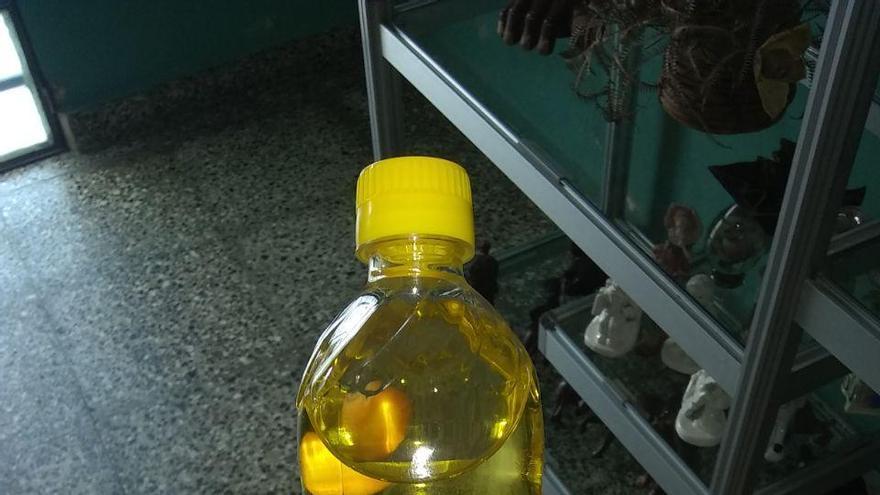
![]() 14ymedio, Havana, 31 October 2019 — The oil which is distributed every month through the ration book has begun to be distributed in Havana in sealed plastic containers with the aim of preventing the adulteration of the product and its sale in the informal market, according to the official press.
14ymedio, Havana, 31 October 2019 — The oil which is distributed every month through the ration book has begun to be distributed in Havana in sealed plastic containers with the aim of preventing the adulteration of the product and its sale in the informal market, according to the official press.
The new way of presenting this refined product, available in the bodegas (ration stores) managed by the State, is part of the “consolidation of the regulations in force in Cuba for consumer protection and safety policy for foods.”
Although it has already been sold in some bodegas, the bottled oil will be officially marketed since November 1 to the inhabitants of the Cuban capital, at the price of 1 CUP (Cuban peso, roughly $0.04 US). The package is 500 milliliters and can be purchased bimonthly. Previously the oil was sold in bulk and monthly.
Bulk sales have been targeted for decades by consumers who were obliged to bring their own container to receive the product. The previous format also lent itself to adulteration and oil contamination, and the oil often arrived in homes with suspended particles, water and other mixtures.
“Now it will be safer, but it is still insufficient,” Herminia, a 79-year-old retiree who spoke to 14ymedio on Thursday while waiting in line at a bodega in Havana’s Nuevo Vedado neighborhood to buy some rice. “The main problem we have is that it is not enough,” she emphasizes.
The oil is one of the products most in demand by Cubans for cooking and for decades has been part of the products that are sold illegally, after being diverted from state trading networks or food processing centers.
A common practice among the ration store staff is to serve each consumer in the rationed market a smaller amount than is their regulated quota and then sell the leftovers “under the counter.” The authorities affirmed that the new plastic bottles “do not allow the adulteration of the product.”
The Ministry of Food Industry (Minal) said that this decision “responds to a demand from the population,” according to a report broadcast on national television.
Francisco Hernández Torres, technical director of the Edible Oils and Fats Company, explained that “technological equipment that allows the process of labeling, capping and filling with accuracy and quality” is already installed.
“The objective is to guarantee the safety of the product, to ensure that it reaches the population as it left the industry, without adulterations,” added Diorgys Hernández Díaz, staff with the general management of industrial policy for Minal.
Minal reports that more than 213,000 bottles have already been distributed in the warehouses of the capital and clarified that this form of packaging has not yet reached the rest of the provinces. Hernández Díaz said that new equipment will soon be available for installation in the factories of Camagüey and Santiago de Cuba.
Officials say that the oil has the same composition as that sold in stores in convertible pesos, a product that is frequently scarce and experienced severe shortages at the beginning of this year.
Refined oils are in the midst of a bitter controversy about the effect they have on human health because strong chemicals are used in their preparation, which eliminates part of the beneficial nutrients natually contained in the seeds.
__________________
The 14ymedio team is committed to practicing serious journalism that reflects Cuba’s reality in all its depth. Thank you for joining us on this long journey. We invite you to continue supporting us by now becoming a member of 14ymedio. Together we can continue transforming journalism in Cuba.
